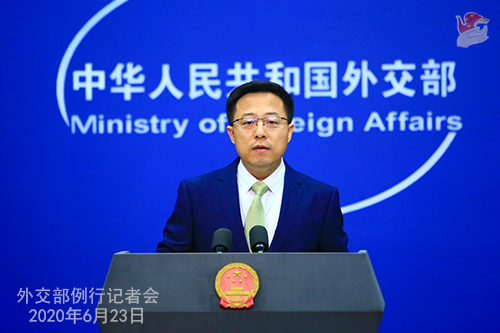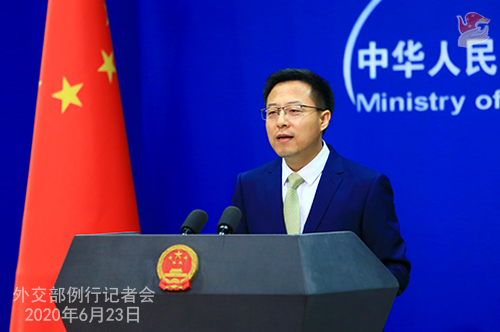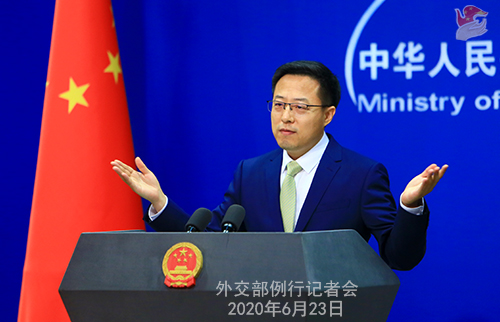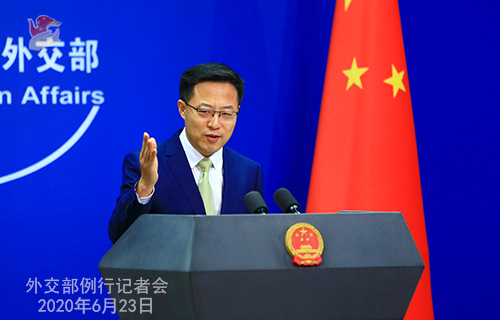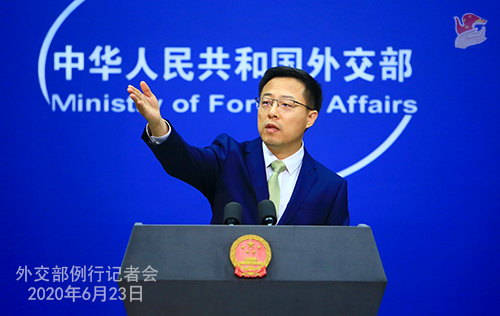| Foreign Ministry Spokesperson Zhao Lijian's Regular Press Conference on June 23, 2020 |
| 2020-06-23 22:16 |
|
Xinhua News Agency: On June 22, the UN Human Rights Council adopted a second China-sponsored resolution titled "promoting mutually beneficial cooperation in the field of human rights". Do you have a comment? Zhao Lijian: On June 22, the UN Human Rights Council adopted for a second time a resolution put forward by China titled "promoting mutually beneficial cooperation in the field of human rights", after a similar resolution was adopted in 2018. The resolution calls upon countries to uphold multilateralism, foster a new type of international relations featuring mutual respect, fairness, justice and mutually beneficial cooperation, and build a community with a shared future for mankind. It also calls upon all countries to undertake genuine dialogue and cooperation in the field of human rights, share good practice and experience in promoting and protecting human rights, enhance human rights technical assistance and capacity-building to realize win-win cooperation. It is China’s hope that an atmosphere of win-win cooperation can be fostered at the UNHRC and that the common goal shared by all countries of promoting and protecting human rights will be achieved through constructive dialogue and cooperation. Many countries expressed the view that China’s call for upholding multilateralism and win-win cooperation in human rights is of important significance. It speaks of the collective wish of developing countries and goes with the overriding trend of global human rights governance. The surging global pandemic is a sober reminder that all mankind is a community with a shared future. We can only deal with global challenges by strengthening international cooperation. China stands ready to work with the international community to uphold multilateralism with concrete deeds to better promote and protect human rights and improve all people’s well-being. The Global Times: The US and Russia held a new round of arms control dialogue on June 22 in Vienna. US Special Presidential Envoy for Arms Control Marshall Billingslea posted a picture of Chinese flags at empty seats around the negotiating table on Twitter, saying that “Vienna talks about to start. China is a no-show. Beijing still hiding behind #GreatWallofSecrecy on its crash nuclear build-up, and so many other things.” Do you have any comment? Zhao Lijian: China has on many occasions stated its position on opposing trilateral negotiations of arms control, which I will not repeat here. It is unserious, unprofessional and unappealing for the US to try getting people’s eyes in this way. We urge the US to stop playing such dull tricks, earnestly respond to Russia’s call of extending the New START, and have serious, sincere talks on this. I think this also serves the common aspiration of the international community. By the way, the “Chinese flags” on the US negotiating table have apparently erroneous patterns. We hope certain people in the US can do their homework and improve their general knowledge to avoid becoming a laughing stock.
CNR: On June 15, a report titled The Origins of the COVID-19 Global Pandemic, Including the Roles of the Chinese Communist Party and the World Health Organization was released by US House Foreign Affairs Committee Lead Republican Michael McCaul, who also leads the GOP China Task Force. It includes a timeline of key events concerning COVID-19 since the end of 2019, purportedly showing how the Chinese Communist Party covered up the epidemic and the role played by WHO in the process. The report called for an international investigation into China’s initial cover-up and for Director-General Tedros’ resignation. What’s China’s comment on this? Zhao Lijian: This so-called report by a certain US Congressman spreads disinformation in an attempt to smear China and deflect the US government’s responsibility for incompetent response. It is nothing but another clumsy farce directed by anti-China forces in the US. The various rumors they spread have been laid bare by the white paper entitled "Fighting COVID-19: China in Action" and the "Reality Check of US Allegations Against China on COVID-19" released by the Chinese side. I would like to take some time to review some important dates in the early stage of the outbreak. On December 27, 2019, Hubei Hospital of Integrated Traditional Chinese and Western Medicine reported cases of pneumonia of unknown cause to the Wuhan Jianghan Center for Disease Prevention and Control. On December 30, the Wuhan City Health Commission issued Urgent Notice on Treatment of Patients with Pneumonia of Unknown Cause. On December 31, the NHC made arrangements to send a working group and an expert team to Wuhan to guide its response to the situation. On January 1, 2020, the NHC set up a leading group on the disease response. On January 3, China started to send regular updates to WHO as well as other countries and regions, including the US. On January 7, China CDC and other research institutions isolated the novel coronavirus strain. On January 9, China informed WHO of pathological identification results. On January 12, China submitted to the Global Initiative on Sharing All Influenza Data the genome sequence of the novel coronavirus to share the information with the international community. Hubei Province began releasing updates on its official website from December 31, 2019. Starting from January 21, 2020, the NHC releases information of the previous day on its website on a daily basis. From February 16 to 24, a WHO-China Joint Mission of experts started its field visit to Beijing, Sichuan, Guangdong and Wuhan, agreeing that the Chinese government’s decisive, strong and timely measures prevented hundreds of thousands of people from getting infected. I want to stress that the novel coronavirus is a new virus never seen before. It takes a process to identify and study it. This process is far from over now. This is the consensus of the international community. After reaching initial findings, we notified relevant sides at the earliest time possible, showing a strong sense of responsibility. China’s response is an open book with plain facts and clear data. It can stand the test of time and history. To conclude, we hope the certain US politician will respect science and basic facts, stop wantonly attacking and smearing China, and channel efforts towards improving prevention and control at home to safeguard Americans’ life and health and playing a constructive role in the concerted global response. The Paper: According to reports, Indian army sources said on June 22 that an 11-hour long meeting at the level of corps commanders was held between India and China. The two sides exchanged views on the current situation in the border area. Can you confirm and offer more information? Zhao Lijian: On June 22, Chinese and Indian border troops held a second round of commander-level talks in the border area. This is also the first such meeting after the Galwan Valley incident on June 15. The holding of the talks shows that both sides hope to properly handle differences and manage and ease the situation through dialogue and consultation. During the talks, the two sides, on the basis of the first commander-level talks, had an in-depth and candid exchange of views on outstanding issues in border management and control and agreed to take necessary measures to lower the temperature. Both agreed to keep up dialogue and work together for peace and tranquility on the ground along the border. Reuters: The Indian Army said that both sides agreed to disengage the troops in the disputed areas. Can you confirm that? Zhao Lijian: The relevant measures are coordinated and arranged by the border troops of the two countries on the ground. I have no further information to release.
BBC: We’ve been hoping at some time to get the number of Chinese troops who might have been killed or injured in the incident. Do you have that information available yet? Zhao Lijian: As I said yesterday, China and India are resolving the issue on the ground through military and diplomatic channels. As for Indian media reports that cite Indian officials as saying at least 40 Chinese soldiers were killed, I can tell you responsibly that this is false information. Beijing Daily: On June 22, US Secretary of State Pompeo issued a statement that the US is extremely concerned by the People’s Republic of China’s (PRC) decision to proceed with formal charges against Canadian citizens Michael Kovrig and Michael Spavor. These charges are politically motivated. The United States stands with Canada in calling on Beijing for the immediate release of the two men and rejects the use of these unjustified detentions to coerce Canada. Canadian Prime Minister Trudeau also deplored China’s “arbitrary detention of Canadian citizens”, saying “it’s a real shame that China continues to punish Canadians for a decision by our independent judicial system in Meng’s case.” I wonder if you have any comment? Zhao Lijian: I don’t know how the US and Canada can be so blatant and presumptuous to talk about “political motivation”, “unjustified detention” and “arbitrary detention”. Those labels should be most suitably pinned on them. Under the pretext of national security, the US has been abusing state power and doing everything it can to oppress Huawei. The Meng Wanzhou incident is a serious political incident, as proved by a Canadian Security Intelligence Service report recently disclosed by a Canadian court. If “judicial independence” justifies the arbitrary detention of Meng Wanzhou by the US and Canada, why do the two countries intervene in the independent handling of cases by Chinese judicial organs? Our perception on American and Canadian politicians hits a new low due to such brazen practice of double standards. Shenzhen TV: On June 17, The American Prospect published a long report on Taiwan funding of think tanks. It disclosed that the five think tanks—the Hudson Institute, the Center for Strategic and International Studies, the Brookings Institution, the Center for American Progress and the Center for a New American Security received funding from the Taiwan authorities and produced policy papers pushing for expanded arms sales and trade agreements with Taiwan. Do you have any comment? Zhao Lijian: I noted relevant reports and you need to ask those US think tanks. I want to stress that the one-China principle is the political foundation of China-US relations and the universal consensus of the international community. China firmly opposes US military ties with and arms sales to Taiwan, and the signing of any trade agreement of sovereign implication between the US and Taiwanese businesses. The US should abide by the one-China principle and three China-US joint communiques and prudently and properly handle Taiwan-related issues to avoid harming China-US relations and cross-straits peace and stability. The relevant US think tanks should conduct their studies in a fair and objective manner and make more reasonable voices. China Daily: On June 23, Kiribati’s presidential run-off results show incumbent President Taneti Maamau winning another term. Does China have any comment? Zhao Lijian: China extends congratulations on the smooth presidential election in Kiribati and to President Maamau on his re-election. We believe that under President Maamau’s leadership, the government and people of Kiribati will achieve new progress in national development. Since diplomatic ties were resumed in September 2019, China and Kiribati have maintained a strong momentum of growth in bilateral relations, realizing fruitful cooperation in various areas and bringing tangible benefits for the two peoples. This serves to show that the one-China principle is the overriding trend with popular support. China attaches high importance to growing relations with Kiribati. We stand ready to work with Kiribati’s government in its new term to deepen exchange and cooperation, enhance people-to-people friendship, elevate this relationship to new heights and bring more benefits to the two peoples.
Bloomberg News: I have two questions. The first is about the interview White House trade adviser Navarro gave to FOX NEWS today, which was interpreted as the trade deal with China is over. But President Trump tweeted that it is fully intact. Can you clarify the status of the Phase One trade deal? Is it still in effect? Are Phase Two talks still going to proceed as planned? Is China delivering on the promises it made in the trade deal? My second question is about the three-way talks between China, India and Russia. Will that take place? Who will represent China? What outcomes does China hope to get from these talks? Zhao Lijian: The remarks by the US politician you mentioned are just groundless and absurd. He’s always full of lies and has zero credibility. On your question about the China-US trade deal, China’s position is consistent and clear. I refer you to the competent department for the specifics you are interested in. As to the China-Russia-India video conference, we will release further information once we have it. BBC: Navarro also talked about the meeting when the US found out about the coronavirus during the trade talks, by which time he said “they had already sent hundreds of thousands of people to this country to spread this virus”. Obviously he is implying that this is a deliberate action by China to spread the virus to the US. Do you have a comment on that? Zhao Lijian: The remarks by the US politician you mentioned are just groundless and absurd. The answer, I believe, is self-evident. Let’s not waste our time on this. AFP: Some reports say that the China-India-Russia foreign ministers’ video conference is expected to bring down the temperature along the border between China and India. Is the border issue on the agenda? Zhao Lijian: As I just said, if there is anything new, we will keep you posted. Please stay tuned for further updates. China News Service: The spokesperson of the US Department of State announced on June 22 that China Central Television, China News Service, the People’s Daily, and the Global Times are designated in the US as foreign missions. Do you have any comment? Zhao Lijian: This is the second time that the US listed Chinese media outlets as foreign missions and another proof of blatant political oppression by the US on Chinese media. It will more seriously disrupt normal operations of Chinese media in the US and further expose the hypocrisy of so-called freedom of the press and speech in the US. We strongly urge the US to reject the Cold-War mindset and ideological bias, and to immediately stop and redress such wrongdoing that hurts others and itself. Otherwise, China will be compelled to make necessary response. BBC: Does the US designation affect the visa application of Chinese journalists? Like the number of times they can come in and out of the country? Who they can meet? Zhao Lijian: This will have serious impact on the normal reporting activities of the Chinese media in the US. If you take a look at the matter, you will find their designation as a "foreign mission" is not symbolic, but heralds a series of measures: filling out forms, registration, declaring property, reporting all sorts of information. You can go to the relevant US website to learn more about it. This is not the first time for the US designation of Chinese media outlets.
|
